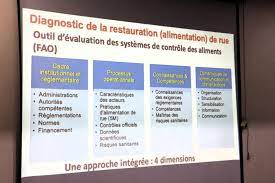The food safety project, which has been implemented in Burkina Faso and Senegal to combat poverty and hunger, has been launched in Mali with the support of FAO and the Grand Duchy of Luxembourg.
On Thursday, July 4, a workshop was held in Bamako to diagnose street food and develop reference documents. This project, supported by the United Nations’ Food and Agriculture Organization (FAO) and funded by the Grand Duchy of Luxembourg, aims to improve the sanitary quality of street food in Burkina Faso, Mali and Senegal. It is part of a global approach to poverty and hunger that focuses on food security and nutrition.
According to the World Health Organisation, more than 91 million people in Africa fall ill from food-borne diseases every year, resulting in 137,000 deaths. Street food, which is ubiquitous in large African cities, plays an important role in providing workers with ready-to-eat meals. The project aims to build capacity to respond to food-related health emergencies and improve the quality of these street meals.
Dr. Diarra Dioumé Cissé, representing the National Institute of Public Health, expressed her satisfaction at Mali joining the project after Burkina Faso and Senegal.
“We have implemented this project by involving all those involved in catering and technical services,” she said, noting the importance of this project for Mali, given its restoration problems.
Dr. Abdoulaye Aziz Kossibo of the FAO explained that rapid urbanization and population growth are increasing the demand for food, making street food essential for many workers.
Mamadou Ndiaye, a food safety expert, emphasised the urgent need to improve the sanitary quality of street food, noting that the African region bears one-third of the global burden of foodborne diseases.
The objectives of the project include the production of reference documents to guide street vendors and health inspectors.
Mr. Ndiaye emphasised the need to train street vendors, implement strict regulations and ensure rigorous monitoring. Cooperation between all food sector stakeholders is crucial to the success of this project.
The workshop brought together representatives of public, private and non-governmental structures, as well as street food organisers.
The expected outcomes include the presentation of the project to all stakeholders, the validation of definitions and methodologies, and the commitment of stakeholders to effective implementation.
MD/ac/sf/lb/as/APA


